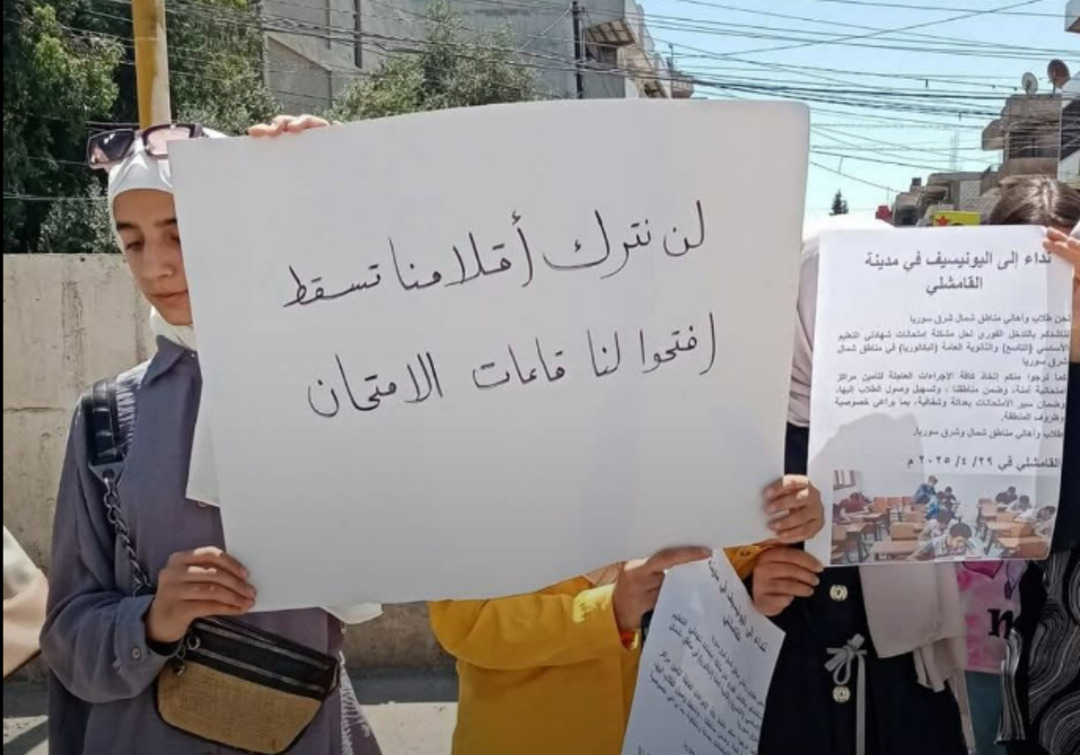-
Suspension of Education in Hasakah: Amidst the Conflict Between the Government and Self-Administration

Under the influence of political shifts in northeastern Syria, the self-administration has taken control of areas that were previously under the regime's control following the collapse of Bashar al-Assad's rule, including the so-called "security squares" in the cities of Hasakah and Qamishli. These changes have led to a near-total paralysis of the educational process in the governorate, with government schools that followed the Ministry of Education's curricula closing down, while only a limited number of private schools remained open, including those affiliated with religious organizations.
These adverse conditions have deprived around 60,000 students of completing their education, creating a situation of uncertainty regarding the consequences. In particular, students preparing for their intermediate and secondary certificates, estimated to number around 25,000, are facing complex challenges due to the lack of an agreement between the Syrian government and the self-administration on the mechanisms for opening registration centers for exams in the self-administration areas.
Despite ongoing negotiations between the two parties, the exchange of harsh accusations regarding negligence and obstruction has yielded unfruitful results, as students are unable to register for exams, threatening the fate of their academic achievements. Additionally, moving to other governorates such as Deir ez-Zor or Damascus to register or take exams poses several obstacles, including difficulties in transportation, high travel and accommodation costs, and the deteriorating economic situation of many students' families.
In response, dozens of parents staged a sit-in on April 27 in front of the UNICEF headquarters in Qamishli to protest the deprivation of their children’s right to take exams in Hasakah governorate. The protesters called on the Ministry of Education of the Syrian government and the Education Board of the self-administration to cooperate to enable students to take their exams.
Abdullah Alyan, a retired teacher from the Qamishli countryside, described the situation, stating, "Not allowing students to take exams in these areas will be a black mark in everyone's history." Meanwhile, Shahnaz Moussa, a mother of two students, said, "The economic situation is very difficult, and we cannot leave young children away from their families."
In this context, Fared Saadoun, a former dean of the Faculty of Arts at Al-Furat University, discussed the implications of the crisis, affirming that it is not just a problem but a disaster threatening the entire community. As the sit-in continued, the self-administration announced that it had extended the registration period to support students and called for the conduction of exams.
The Education Board of the self-administration stated that it is ready to implement this under the supervision of UNICEF but referred the agreement with the Ministry of Education to political bodies for approval. However, no official response has been issued by the ministry, further increasing the suffering of students and their families in Hasakah.
Concerns are rising that an entire generation could lose access to education, which is fundamental for the region's future, in a continuing conflict that threatens to reshape educational opportunities for young people. As the political strife remains ongoing, children and youth are paying the price in a struggle that appears far from resolution.
You May Also Like
Popular Posts
Caricature
BENEFIT Sponsors BuildHer...
- April 23, 2025
BENEFIT, the Kingdom’s innovator and leading company in Fintech and electronic financial transactions service, has sponsored the BuildHer CityHack 2025 Hackathon, a two-day event spearheaded by the College of Engineering and Technology at the Royal University for Women (RUW).
Aimed at secondary school students, the event brought together a distinguished group of academic professionals and technology experts to mentor and inspire young participants.
More than 100 high school students from across the Kingdom of Bahrain took part in the hackathon, which featured an intensive programme of training workshops and hands-on sessions. These activities were tailored to enhance participants’ critical thinking, collaborative problem-solving, and team-building capabilities, while also encouraging the development of practical and sustainable solutions to contemporary challenges using modern technological tools.
BENEFIT’s Chief Executive Mr. Abdulwahed AlJanahi, commented: “Our support for this educational hackathon reflects our long-term strategic vision to nurture the talents of emerging national youth and empower the next generation of accomplished female leaders in technology. By fostering creativity and innovation, we aim to contribute meaningfully to Bahrain’s comprehensive development goals and align with the aspirations outlined in the Kingdom’s Vision 2030—an ambition in which BENEFIT plays a central role.”
Professor Riyadh Yousif Hamzah, President of the Royal University for Women, commented: “This initiative reflects our commitment to advancing women in STEM fields. We're cultivating a generation of creative, solution-driven female leaders who will drive national development. Our partnership with BENEFIT exemplifies the powerful synergy between academia and private sector in supporting educational innovation.”
Hanan Abdulla Hasan, Senior Manager, PR & Communication at BENEFIT, said: “We are honoured to collaborate with RUW in supporting this remarkable technology-focused event. It highlights our commitment to social responsibility, and our ongoing efforts to enhance the digital and innovation capabilities of young Bahraini women and foster their ability to harness technological tools in the service of a smarter, more sustainable future.”
For his part, Dr. Humam ElAgha, Acting Dean of the College of Engineering and Technology at the University, said: “BuildHer CityHack 2025 embodies our hands-on approach to education. By tackling real-world problems through creative thinking and sustainable solutions, we're preparing women to thrive in the knowledge economy – a cornerstone of the University's vision.”
opinion
Report
ads
Newsletter
Subscribe to our mailing list to get the new updates!






















